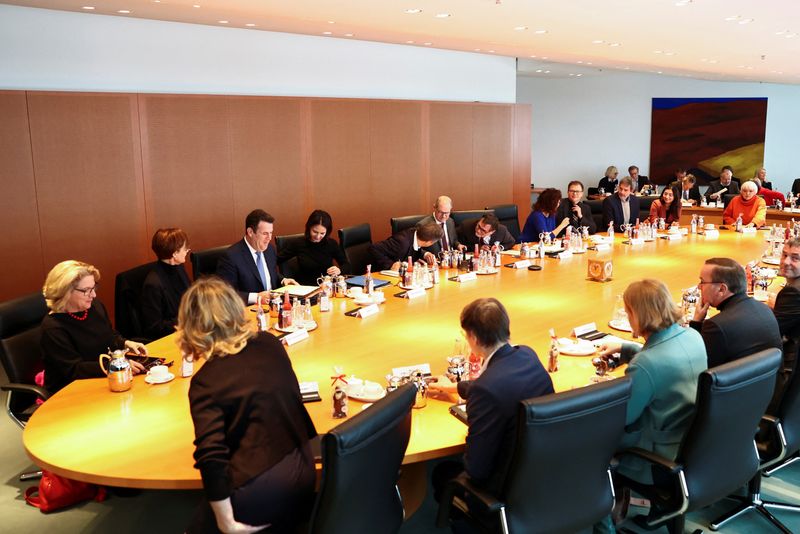German coalition parties at loggerheads as budget crisis grows
2023.12.06 10:36
2/2

© Reuters. German Chancellor Olaf Scholz and other ministers attend the weekly cabinet meeting at the Chancellery in Berlin, Germany December 6, 2023. REUTERS/Liesa Johannssen
2/2
By Christian Kraemer and Andreas Rinke
BERLIN (Reuters) -Germany’s coalition partners intensified efforts on Wednesday to find a way to plug a 17-billion-euro ($18.3 billion) hole in next year’s budget after failing to resolve the crisis overnight, increasing uncertainty about financial plans in Europe’s biggest economy.
The failure of talks between coalition leaders before Wednesday means it is unlikely parliament will approve a 2024 budget by the end of the year, leaving in limbo spending plans from climate projects to benefits and for local authorities.
Social Democrat (SPD) Chancellor Olaf Scholz, Greens Vice Chancellor Robert Habeck and Finance Minister Christian Lindner of the fiscally conservative Free Democrats (FDP), had hoped to get an agreement overnight to put to cabinet on Wednesday.
However, no deal was reached. Coalition sources told Reuters that while talks would continue on Wednesday, little progress had been made overnight and the parties were still far apart.
A German government spokesperson said he expected the cabinet to agree on the budget this year but declined to be more specific.
“I have learned to expect spontaneity with this coalition,” said the spokesperson.
The budget crisis arose last month when the Constitutional Court blocked the reallocation of 60 billion euros of unused pandemic emergency funds to climate projects, throwing the government’s financial planning into disarray.
At stake is funding for local authorities, businesses and federal states and the longer the wrangling goes on, the greater the uncertainty becomes.
DEBT BRAKE CONUNDRUM
A central question is whether to lift Germany’s self-imposed limit on net new borrowing in 2024, a move Lindner fiercely opposes.
He bowed to pressure to suspend the cap, known as the debt brake, for this year after the constitutional court ruling but on Tuesday reiterated his opposition to doing that for a fifth straight year, saying it must not become the norm.
To suspend the debt brake, the government can declare an emergency situation – such as the coronavirus pandemic or energy price spike due to Russia’s invasion of Ukraine – and parliament has to agree.
“You cannot make an emergency situation a normal situation,” Lindner told ARD.
The debt brake is embedded in Germany’s constitution and restricts the public deficit to 0.35% of gross domestic product.
Lindner also opposes tax increases and wants to plug the budget gap mainly through cuts to spending – a fundamentally different approach to the SPD and Greens.
The Greens want to stick with investment climate projects and ensure Germany’s transformation to a green economy.
Scholz, who will face party members at a conference at the weekend, is loathe to agree to trimming spending on welfare benefits, such as unemployment pay, which the FDP favours.
The budget wrangling has raised tensions in the already loveless three-way coalition and polls show the big winners of the crisis are the opposition conservatives and far-right Alternative for Germany (AfD).
If no deal is reached, the coalition could collapse but most observers say it is in all the parties’ interests to hammer out an agreement and stay in power.
Greens’ co-leader Ricarda Lang told German radio a political decision would be made “very, very soon” and the coalition had to find a compromise to avoid a wider government crisis.
A temporary budget could kick in for next year if no agreement is finalised. This happens regularly after federal elections are held but before a budget has been agreed.
($1 = 0.9267 euros)








